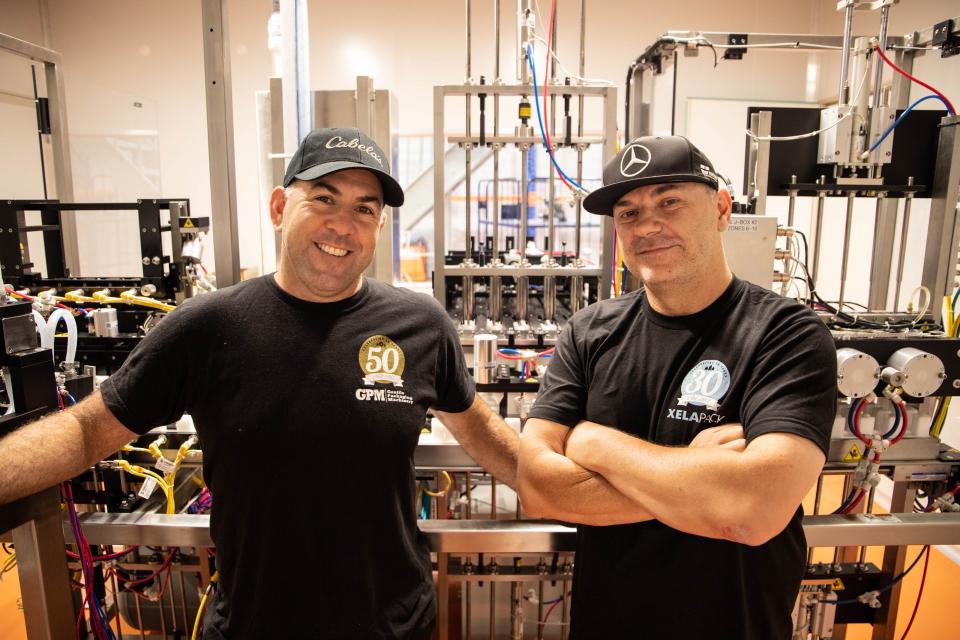Two New Zealand entrepreneurs are celebrating a world-first after establishing a licensing agreement with US company Xela Pack.
The partnership means Xela Pack’s innovative, more sustainable packaging will be produced outside the US for the first time under the Xela Oceania name.
Xela Pack, which is based in Saline, Michigan, focuses on small-dose or multi-dose packaging between 5ml and 30ml. The packets are made predominantly from recycled paper, use approximately 93% less plastic than similar-sized bottles and tubes and take up around 20% less space than plastic bottles. They can be used for liquids, powders, tablets and granulated products and are used in a range of sectors, including food, natural health, dietary supplements, oral care, cosmetics, hotels and cruises, and pharmaceuticals.
The packaging has excellent barrier properties and can be opened and closed, which means it can be used multiple times, and it won’t leak, spill or let oxygen in to affect product quality. There is also more room for printing and less product wastage when compared to plastic bottles.
The business started life back in 1967 when Gentile Packaging Machinery (GPM) was started by Aliseo Gentile. In 1987, he and his wife Cathy launched a new contract packaging company called Genpack USA and, in 1994, long before the current wave of anti-plastic sentiment, they decided to focus solely on this more sustainable, less wasteful kind of packaging and changed its name to Xela Pack.
GPM has built all the machines used by Xela Pack - and the machine that will be used by Xela Oceania in New Zealand. It uses specific materials that are provided by Xela Pack and these have been through rigorous compatibility tests to ensure they work at certain temperatures, pressures and times.
“This is high-quality engineering and they pride themselves on it,” says Jason Shaw, co-founder of Xela Oceania. “They’re beautiful machines and they’re built to last. The first machine it made is still operating.”
GPM decided to modernise the Xela Pack machines in 2018 and add connectivity, not just for its own benefit, but so that it could start selling them. “The idea was that we would be selling to companies that were producing their own products and potentially move into different countries,” says Anthony Gentile, the vice president of GPM, director of marketing at Xela Pack, and son of the founder.
But that order was reversed after meeting Shaw at a trade show in the US, where they discussed the potential of establishing an exclusive licensing agreement.
“We worked out the terms for them to be able to be the first to produce Xela Packs outside the US - and the first people outside our own family. It’s really exciting in that sense. We just really like Paul [Zaloum] and Jason. We found people who we thought had the motivation, intelligence and capability to do what it takes to start a company from the ground up.
"Our success is their success and our goal is for this to be profitable for Xela Oceania. We have all the confidence in the world in them. A huge step would be seeing a second machine heading over there.”
Xela Pack’s director of sales Carolynn O’Connor says there’s currently a lot of energy around more sustainable packaging and a lot of it comes from brands and product companies.
“We’ve done more innovation and R&D in the past year and a half than in the past 20 years. We’re getting requests from every direction.”
One recent request was from an airline looking to produce an additive in a Xela Pack that could be squeezed into a glass to make a cocktail. There has also been a lot of demand for larger sizes and Xela Pack USA is looking at developing 125ml, 250ml and 500ml packets.
Xela Pack is currently looking to remove all foil from its packets and investigating the complete removal of plastic or substituting them for bioplastics.
“The benefit we always saw with this model is they’re always working on R&D,” says Shaw. “We need to get more machines on the ground so they can invest in more R&D. Getting the income going here is a really good recipe for that.”
And while there have been understandable delays with on-site training and delivery due to Covid-19, being able to call on Xela Pack’s 30-plus years of experience gives the pair plenty of confidence.
Shaw, who has worked in the honey industry for ten years, and Zaloum, who studied production engineering and has worked in biosecurity and as a ship officer, are based in Albany and will initially focus on pushing Xela Pack in the honey sector, but they aim to extend into other high-value sectors that require more sustainable single or multi-dose packaging.
The pair believe this technology is hitting the New Zealand market at the perfect time and want to take a bite out of the $4 billion local packaging industry, reduce the impacts on the planet and eventually take Xela Pack to other markets like Australia and India.
“We want to be the Tetra Pak of small and multi-dose packaging,” says Shaw. “That’s our goal. We’re here for a long time and we’re here to do the job right.”
Visit www.xela.co.nz
Photo: Paul Xaloum (left) and Jason Shaw.


